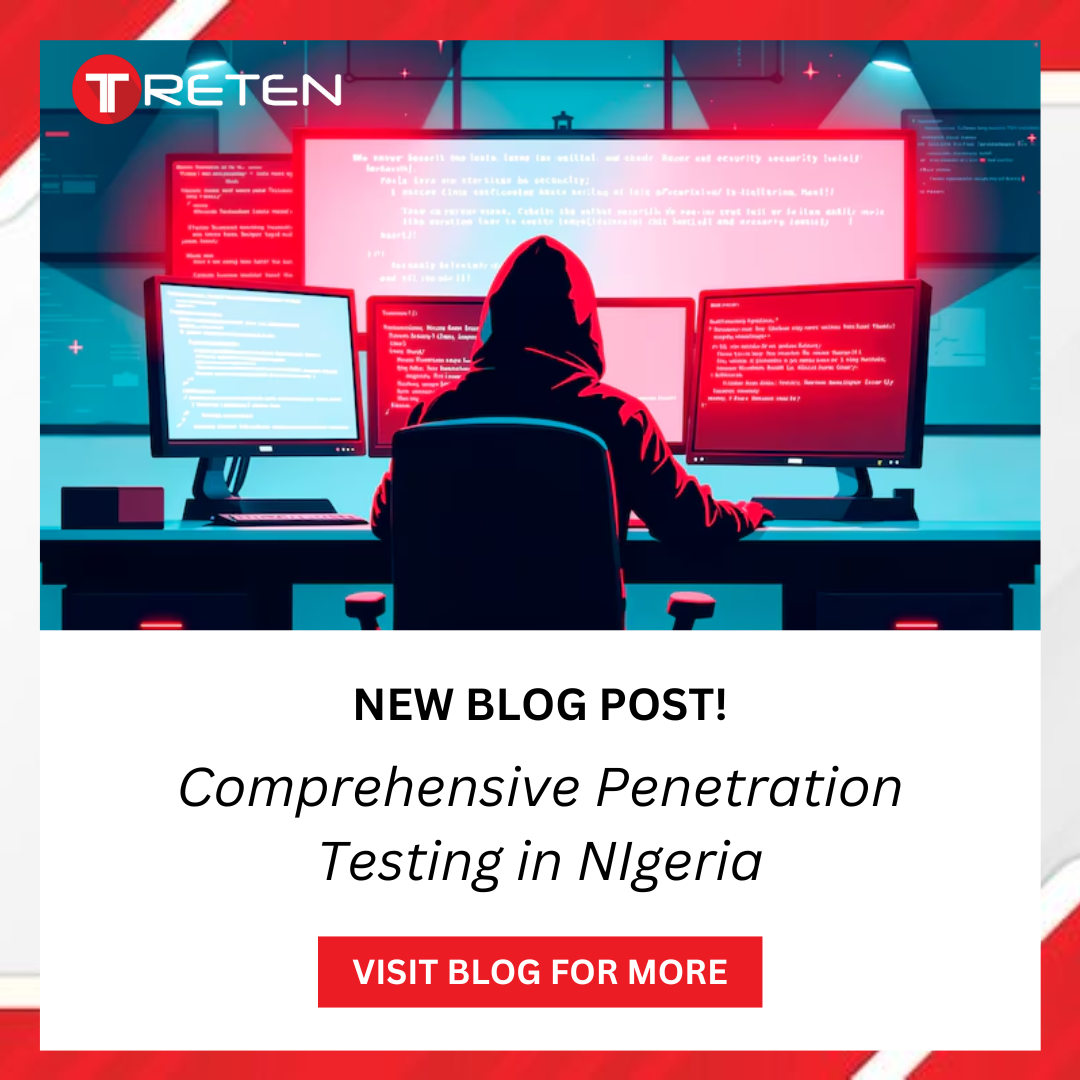Comprehensive Penetration Testing in Nigeria
Cyber Threats Are Rising Across Every Nigerian Industry
In today’s digital economy, Nigerian businesses—from banks and hospitals to retailers and manufacturers—are embracing new technologies to streamline operations and enhance customer experience. But this increased digital exposure comes with a major downside: greater vulnerability to cyberattacks. Read More
The Reality: Cybercriminals Don’t Discriminate by Industry
No business is too small or too big to be a target. Whether you’re a fintech startup or a retail chain, your data, infrastructure, and customer trust are at risk. Unfortunately, many Nigerian industries lack proactive testing strategies to detect and resolve hidden vulnerabilities.
The Solution: Industry-Tailored Penetration Testing
Penetration testing—also known as ethical hacking—is a strategic method to identify weaknesses in your systems before real hackers can exploit them. In this blog post, we’ll explore how Nigerian businesses in various sectors can implement penetration testing effectively, using industry-specific techniques, tools, and priorities.
What Is Penetration Testing?
Penetration testing is a controlled simulation of a cyberattack on your systems, networks, or applications. It helps uncover exploitable flaws so you can fix them before a real breach occurs. Think of it as a “digital fire drill” that strengthens your readiness and security posture.
Types of Penetration Testing Relevant to Nigerian Businesses
-
Network Testing – Internal and external network infrastructure
-
Web App Testing – Websites, portals, and APIs
-
Mobile App Testing – Android/iOS applications
-
Wireless Testing – Wi-Fi and connected devices
-
Social Engineering – Testing human factors via phishing or impersonation
-
Physical Security Testing – On-site access control simulations
Industry-Specific Penetration Testing Approaches
Here’s how businesses in major Nigerian industries can implement customized penetration testing strategies:
1. Financial Services
Why It Matters: Nigerian banks, fintechs, and payment platforms handle sensitive financial data and are frequent targets of phishing, DDoS attacks, and ransomware.
Key Focus Areas:
-
Web and mobile app testing for secure transactions
-
API security for payment gateways
-
Internal network segmentation to isolate core banking infrastructure
-
Social engineering simulations targeting customer service and call centers
-
PCI DSS and NDPR compliance validation
Suggested Tests:
-
Multi-factor authentication bypass simulations
-
Credential stuffing and brute-force attack attempts
-
ATM and POS network vulnerability testing
2. Telecommunications
Why It Matters: Telecom companies provide the backbone for digital communication, making them prime targets for espionage and infrastructure sabotage.
Key Focus Areas:
-
Core network penetration testing (SS7, VoIP, and SIP protocols)
-
Web app testing for customer portals and billing systems
-
Physical security testing for telecom towers and data centers
-
Wireless testing of internal staff networks and mobile apps
Suggested Tests:
-
SIM-swap simulation and identity theft exploits
-
API fuzzing for service provisioning endpoints
-
Firewall and DDoS mitigation assessments
3. Small & Medium Enterprises (SMEs)
Why It Matters: SMEs often lack dedicated cybersecurity teams and are easy targets for ransomware and phishing attacks.
Key Focus Areas:
-
Network scanning for misconfigured devices and weak passwords
-
Basic web app testing (especially for eCommerce or CRM platforms)
-
Email phishing simulations
-
Password policy enforcement and endpoint security
Suggested Tests:
-
Remote desktop protocol (RDP) exposure tests
-
Credential reuse simulations across accounts
-
DNS spoofing and email spoofing detection
4. Healthcare
Why It Matters: Hospitals and medical facilities hold patient health records, making them lucrative targets for ransomware and data theft.
Key Focus Areas:
-
Web app and EMR (Electronic Medical Records) system testing
-
Wireless network security in hospital environments
-
Access control testing for medical devices (IoT security)
-
Compliance with Nigeria’s health data protection policies
Suggested Tests:
-
Insecure medical device communication exploits
-
Data leakage simulations on unsecured storage systems
-
Role-based access privilege escalation tests
5. Retail & eCommerce
Why It Matters: Nigerian retailers are moving online. ECommerce platforms, POS systems, and digital wallets are exposed to financial fraud and data breaches.
Key Focus Areas:
-
Website testing for vulnerabilities like SQL injection and XSS
-
Mobile app testing for transaction security
-
Network segmentation between sales terminals and corporate networks
-
API testing for third-party integrations
Suggested Tests:
-
Fake order injections to test transaction validation
-
Session hijacking and token replay attacks
-
Customer data scraping and enumeration checks
6. Manufacturing & Industrial Operations
Why It Matters: Factories and industrial plants using IoT and SCADA systems are exposed to sabotage, ransomware, and espionage.
Key Focus Areas:
-
Network testing of Industrial Control Systems (ICS)
-
Air-gapped systems simulation
-
Physical security assessments for restricted zones
-
Insider threat simulation
Suggested Tests:
-
PLC manipulation attempts
-
Social engineering of maintenance staff
-
Testing of remote monitoring and update systems
How Nigerian Companies Can Perform Basic Penetration Testing
Not every company can afford a full-time cybersecurity team—but basic penetration testing is still possible. Here’s a simplified roadmap:
Step 1: Identify and Prioritize Assets
Start by identifying what systems matter most in your sector:
-
Finance: Core banking, APIs
-
Telecom: Network gateways, billing apps
-
Healthcare: Patient data, EMR systems
-
Retail: POS systems, shopping portals
-
Manufacturing: SCADA, OT networks
Step 2: Use Reconnaissance Tools
Scan publicly available data using:
-
Shodan – For exposed IoT and industrial devices
-
Whois / Nslookup – To check domain information
-
Google Dorks – To uncover exposed directories and files
Step 3: Run Vulnerability Scanners
Use tools like:
-
Nmap – Network mapping
-
OpenVAS or Nessus Essentials – Vulnerability scanning
-
OWASP ZAP – Web application security testing
Step 4: Attempt Exploitation (With Permission!)
Try simulating real-world attacks:
-
Password brute-force using Hydra
-
XSS injection with Burp Suite
-
API fuzzing with Postman or Fuzzapi
Step 5: Report and Fix
Create a report tailored to your industry:
-
Include screenshots, affected systems, and impact level
-
Prioritize fixes based on potential business damage
-
Retest after patching
Tools Suitable for Industry Testing
| Tool | Best For | Sector Suitability |
|---|---|---|
| Nmap | Network scanning | All |
| Burp Suite | Web app testing | Finance, Retail, Healthcare |
| Metasploit | Exploitation framework | All |
| Wireshark | Network traffic analysis | Telecom, Manufacturing |
| OWASP ZAP | Web security | SMEs, Retail, Finance |
| Nikto | Web server scanning | SMEs, Healthcare |
| SCAPY | Packet crafting (advanced) | Telecom, Manufacturing |
Penetration Testing Frequency by Industry
| Industry | Recommended Frequency |
|---|---|
| Finance | Quarterly |
| Telecom | Quarterly or Bi-annually |
| SMEs | Annually or after major change |
| Healthcare | Annually |
| Retail | Bi-annually |
| Manufacturing | Annually + after firmware updates |
Conclusion
No matter your industry, penetration testing is no longer a luxury—it’s a cybersecurity necessity. Nigerian organizations across all sectors must take proactive steps to detect and eliminate weaknesses before attackers exploit them.
By customizing your approach based on your industry, using free tools, and following structured testing processes, you can build a strong, scalable defense against modern cyber threats.
Contact us today for FREE CONSULTATION
FAQs
Q1: Can industry-specific regulations affect penetration testing requirements?
A1: Yes. For example, NDPR applies across sectors, but finance and healthcare often have stricter compliance needs requiring more frequent or deeper testing.
Q2: Can internal IT teams handle penetration testing?
A2: For basic testing, yes. But for deep assessments—especially in finance or telecom—external experts or red teams are recommended.
Q3: How do I prioritize which systems to test first?
A3: Focus on systems that store sensitive data or are exposed to the internet (e.g., websites, APIs, payment portals).
Q4: Is it safe to test production systems?
A4: Testing on production carries risk. Always plan tests during low-traffic periods, get authorization, and use staging environments when possible.
Q5: What’s the first step for a business with no cybersecurity team?
A5: Start with vulnerability scanning using tools like OpenVAS or Nessus, then work with a third-party expert for deeper penetration testing.


